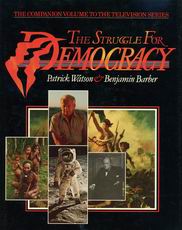
| Home News Releases | Contact |
Sources Bookshelf

The Struggle for Democracy
Watson, Patrick
Publisher: Lester & Orpen Dennys Ltd., CanadaYear Published: 1988
Pages: 320pp Price: $39.95 ISBN: 0-88619-176-9
Library of Congress Number: JC423.W38 1988 Dewey: 320.5
The Struggle for Democracy is the book based on the TV series of the same name. It value lies partly in the historical survey which it offers of the history and development of democracy, and partly in the fact that it raises the question of democracy as something to look at seriously. The chapter on the birth of Greek democracy brings home the fact that democracy as conceived of 2,500 years ago was in some important ways more far-reaching and radical than it is in our present-day, supposedly democratic societies. The Greeks, like the other, undemocratic, ancient societies, still practised slavery and excluded women from citizenship, but they originated the idea that every citizen had the right and obligation to personally participate in making important decisions. Today our idea of democracy is much more limited: for the most part, we have reduced democracy to the periodic election of the people who make the decisions. We no longer believe that the citizens themselves should be the decision-makers.
The Struggle for Democracy also surveys varieties of democratic -- and undemocratic -- government in different countries. One chapter looks at the crucial issue of "The Tyranny of the Majority" -- the continuing and to a large extent inevitable tension between majority rule and minority rights which exists in any society trying to be democratic. A chapter focuses on the rule of law, and another looks at different models of citizenship. Well-illustrated, and filled with a wealth of information, The Struggle for Democracy is still ultimately a disappointment because of the questions it fails to consider. There is no substantive discussion of the relationship between democratic government and economic power. Can there be real democracy as long as so much decision-making power is concentrated in powerful corporations not subject to democratic control? Nor is there any criticism of the idea that democracy can simply be equated with people heading off to the polls every few years. Is this really democracy? The Struggle for Democracy is an interesting book, but it is intellectually weak and uncritical in its approach to many questions.
[Abstract by Ulli Diemer]
Subject Headings
© Sources 2026. The information provided is copyright and may not be reproduced in any form or by any means (whether electronic, mechanical or photographic), or stored in an electronic retrieval system, without written permission of the publisher.